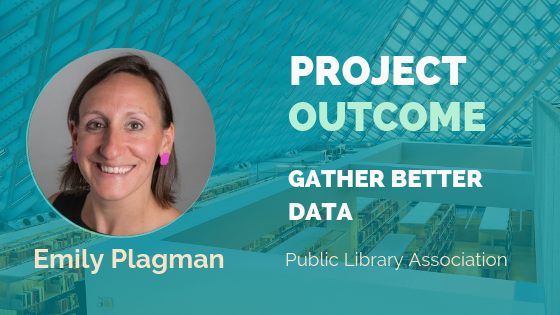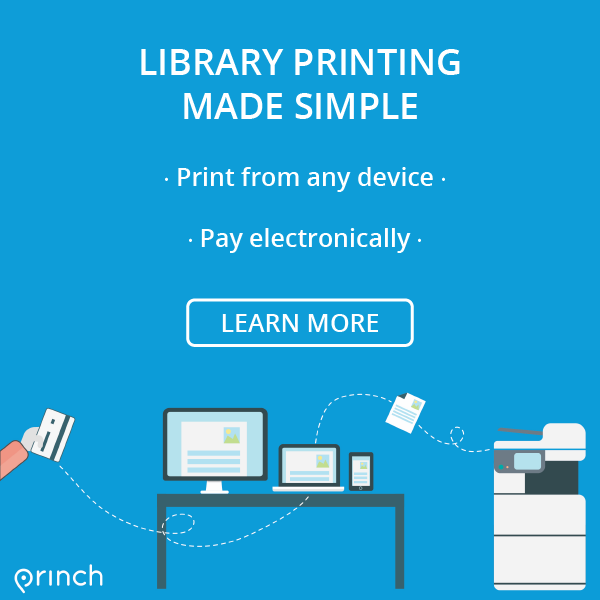Emily Plagman is Manager of Impact & Advocacy for the Public Library Association, implementing the organization’s goals of supporting the field’s ability to collect, analyze and advocate using data, expanding its own internal data collection efforts, and developing of new data-based projects for the field. More specifically, she manages PLA’s performance measurement initiative, Project Outcome, funded by the Bill & Melinda Gates Foundation, overseeing its development and implementation. Prior to joining PLA, Emily worked as a project manager, at the Chicago Metropolitan Agency for Planning on an energy efficiency grant. Emily received her Master’s in International Public Affairs from the LaFollette School of Public Affairs at the University of Wisconsin and her Bachelor’s in Political Science at Marquette University. Read on to learn more about Project Outcome.
Project Outcome
Outcome measurement is one way for library staff to collect data from patrons about the value of public programs and services. Because library staff do not always have in-depth experience in evaluation, they could find themselves unsure of how to write an outcome-focused assessment after collecting patron feedback. For example, staff know that a program like Storytime can help improve literacy of children, but the specific data to reinforce this knowledge is not always present.
The Public Library Association, launched Project Outcome in 2015 which is designed to help libraries gather better data, and then use it to inform a library that a patron learned something new, gained confidence, changed or intends to change their behaviour, and/or has increased their awareness of library resources.
Project Outcome makes outcome measurement quick and easy for library staff. It is a free online toolkit designed to help public libraries understand and share the impact of essential library programs and services. Project Outcome does this through simple surveys and an easy-to-use process for measuring and analyzing outcomes across key library service areas, including:
Participating libraries are also provided with the resources and training support needed to apply their results and confidently advocate for their library. Project Outcome’s standardized surveys allow libraries in the U.S. and Canada to aggregate their outcome data and analyze trends by survey topic and program type. For the first time, libraries can see how the outcomes of their programs and services compare across their system, state and country.
For the first time, libraries can see how the outcomes of their programs and services compare across their system, state and country. Share on XIn early April, the Association of College and Research Libraries will launch its own version of Project Outcome, for academic libraries, with surveys available in the following seven areas:
A lot can be done with outcome data. Even a few patron responses on a survey can be enough information to help libraries make improvements to their programs, communicate library value, advocate on behalf of the library, apply for new funding or create new partnerships. Hundreds of libraries across the U.S. and Canada have used Project Outcome to make changes and increase their impact in the communities they serve.
Hundreds of libraries across the U.S. and Canada have used Project Outcome to make changes and increase their impact in the communities they serve. Share on XHere are some examples:
- Leadership of Appleton Public Library (Wisconsin) viewed Project Outcome as an opportunity to extend outcome measurement to their summer library program and support program improvement and communications with the library’s board of directors.
- Pima County Public Library (Arizona) uses Project Outcome surveys to assess the workshops, classes, trainings and drop-in sessions they provide in the areas of business development, job skills and digital literacy.
- Burnsville Public Library (West Virginia) is an important community anchor within the rural county it serves. The library has used Project Outcome surveys to better understand the impact of its programs while also developing new partnerships and designing new programs based on community input.
- Plano Public Library (Texas) uses Project Outcome surveys with a wide range of programs and services so they can better meet the needs of their highly diverse community and strengthen outcomes for patrons. Serving children, teens and families is a core part of their programming, and a large part of the library system’s outcome measurement has focused on these key demographics.
- Sno-Isle Libraries in Snohomish and Island Counties (Washington) measures outcomes and creates quarterly State of Programming Reports to support their strategic plan.
Project Outcome libraries who have used their outcome data to make decisions have shared these six recommendations to help libraries get started:
Project Outcome for Academic Libraries is launching next month! Sign up now to get a sneak preview of the survey questions and resources. This new toolkit will be in addition to the existing Project Outcome for Public Libraries. Learn more at https://t.co/KA8x90IgNK.
— Project Outcome (@ProjectOutcome) March 20, 2019
The Project Outcome toolkit is designed to help libraries by supporting their efforts to confidently measure the outcomes of their programs and services. The resources on Project Outcome’s website are available to every library and include even more tips and training on how to plan for, measure, and administer the surveys; understand the data, and take action using the results. Outcome data can help libraries communicate what they already know to be true: that the library is a valuable and critical community anchor.
Visit www.projectoutcome.org to sign up for free and learn more.

Emily manages the Public Library Association’s performance measurement initiative, Project Outcome.
Recent posts
Green Libraries: How Sustainable Design is Shaping the Future of Public Libraries
In this week's Princh Library Blog post, recurring guest writer Sam L. Bowman discusses an ever so important topic: sustainable design and [...]
Librarians Supporting Digital Literacy in the Community
In this week's Princh Library Blog, Nina Grant covers why digital literacy is important, the variety of ways in which librarians are supporting [...]




Good morning Madam,
I have gone through you project out come and research paper which you mail me,but i can i have one copy surveying question for me ,so, i can do the same project out come
Hey Sangay! If you are trying to get in touch with the author, Emily, please check out http://www.projectoutcome.org and contact them from there. This will ensure that you receive the answers and support you need in regard to their resources and project materials. I hope this helps 🙂